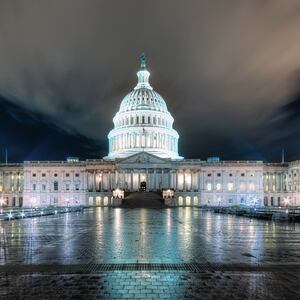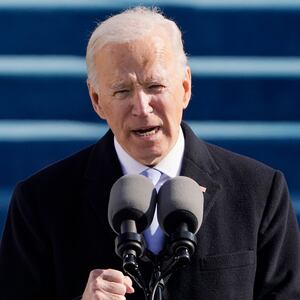Groucho Marx famously said that he refused to join any club that would have him for a member. It would be good for the United States delegation to this week’s Democracy Summit to let the spirit of that remark guide it there.
For the summit, which will virtually host 110 countries, to be of any real value, it needs to establish real benefits for being a democracy, penalties for not being one, incentives to promote democracy, and standards high enough to preclude faux democracies, non-democracies and fading democracies from participating.
So far, the White House has been trying to have it both ways. It has excluded countries like China and Russia from the summit because they’re not democracies and are seen as the central bad actors in President Joe Biden’s view of geopolitics today as a struggle between democracies and autocracies.
In fact, excluding them was, polite press statements notwithstanding, one of the main reasons for holding this event.
On the other hand, it has tried to tiptoe around the list of who is in and who is out with statements like Jen Psaki’s “Inclusion or invitation is not a stamp of approval on their approach to democracy—nor is exclusion a stamp of the opposite of that, of disapproval.” I’m a big Jen Psaki fan, but that is weak stuff. Exclusion most definitely is a stamp of disapproval, as it should be. Indeed, that’s the point. And exclusion has already sent a strong and much-needed message to countries like Turkey, Hungary, Egypt and, for that matter, every government in the Middle East except for Iraq and Israel.
And inclusion is definitely a stamp of approval, one that has been extended to governments and leaders invited despite demonstrably undermining democracy in their own countries? That includes Jair Bolsanaro in Brazil and Rodrigo Duterte in the Philippines, both of whom have shown strong autocratic tendencies. Narendra Modi in India, who has overseen serious backsliding on democratic rights and protections in India. And the governments of Pakistan, Poland, Angola, and Congo, all of which probably should have been dinged from the list. As for Iraq and Israel, the former is often more influenced by the neighboring government in Iran than it is its own people while the other excludes millions within its borders from full participation in its government and society.
Democracies take many forms to be sure. But the idea of a club to reward democracies and those moving in a democratic direction, to penalize enemies of democracy, and to promote the core idea that the people of each country should determine who their leaders are and what directions their country should take demands that lines be drawn.
That is especially important because the Democracy Summit is a U.S. foreign policy initiative that was conceived from the get-go with a domestic political element. When Biden talks about the battle between pro-democratic and pro-autocratic forces in the world, he is not just thinking about China and Russia but also about Donald Trump and his Republican Party’s systematic efforts to undercut democracy here.
This is a party that is defending the organizers of a coup attempt, promoting the principle architect of that attempt as their leader, carving away voting rights, seeking to disenfranchise voters of color through gerrymandering and racism-bespoke voting restrictions, promoting an anti-democratic, extraconstitutional, minority-driven rule in the US Senate, enabling the minority to dictate the course of the judiciary, and promoting campaign finance rules that give huge advantages to America’s wealthiest citizens at the expense of everyone else.
Further, should that party win in 2022 and 2024, the experience of the Trump years suggests they will take further steps to ensure that their president is above the law, carve away at congressional oversight, negate checks and balances, twist the mission of the Department of Justice, and eliminate laws and mechanisms that might constrain their ability to impose their will on the American people.
The efforts of the enemies of democracy in the U.S. have already taken a toll. According to a Pew Global Attitudes survey of leading countries this spring, few believe U.S. democracy is any longer a “good model” for other nations. Among foreigners in 16 countries polled, a median of 17 percent saw us as a good model while 57 percent said “we used to be a good example.” We know it, too. Among Americans surveyed, just 19 percent said we are a good example, while 72 percent said we are no longer.
A decade ago, Freedom House gave the U.S. a score of 94 out of 100 in its “Freedom in the World” report. Today, that number stands at 83 as, it explains: “In recent years its democratic institutions have suffered erosion, as reflected in partisan pressure on the electoral process, bias and dysfunction in the criminal justice system, harmful policies on immigration and asylum seekers, and growing disparities in wealth, economic opportunity, and political influence.”
These are among the very good reasons that Washington Post columnist Jennifer Rubin called on Biden to use the summit to begin to set our own house in order. She writes that the GOP “is conducting itself precisely as illiberal movements in other countries, seeking to corrupt our election system, limit access to the ballot, discredit the sanctity of elections and wink at violence.” And she correctly concludes that therefore, Biden should “commit to passage of meaningful voting reform, if need be by modification of the anti-democratic filibuster, executive branch ethics reform, significant reform of the courts…and criminal justice reform”
But we also must both understand and make it clear that if we continue down the path we are on without the reversals and protections we need, that this first Summit of Democracies may be the last one. A Trumpian America would not and should not qualify for such an event. And the other democracies of the world should use their collective force to send that message and to enumerate the severe costs to the U.S. of falling out of the club—just like those any other backslider or enemy of democracy would face.
We also know that the idea behind the summit is powerful and being excluded from it is such a punishment in and of itself, that even those who clearly do not belong are spinning up arguments that evoke a different Marx brother, Chico, who in the movie Duck Soup asks: “Well, who ya gonna believe, me or your own eyes?”
China, for example, has undertaken an extensive campaign to try to make the ludicrous case that it is a democracy. The State Council produced a paper that asserts, “There is no fixed model of democracy; it manifests itself in many forms.” China’s President Xi Jinping ridiculed the “song and dance” politicians offer up to voters during elections. China has attacked the glaring flaws in America’s system, further emphasizing the costs of the behavior of Trump and the GOP. They even went so far as to have their ambassador to the U.S. pen an op-ed in The National Interest along with Russia’s ambassador in which the two attempt, and spectacularly fail, to do the impossible in claiming that “China has…an extensive, whole-process socialist democracy” and “Russia is a democratic federative law-governed state with a republican form of government.”
Others who were excluded, like Hungary’s Viktor Orban and Turkey’s Recep Tayyip Erdogan, have also whined and howled about being left out with defenses of their own behavior that were so weak, they evoked another Chico line: “I wasn’t kissing her. I was whispering in her mouth.”
While these protests emphasized the potency of the idea of a club of democracies, letting folks in who do not belong undermines it. For that reason, we can only hope that those who slipped in to this event who don’t belong embrace the example of Harpo Marx, and remain silent.
The event will serve other important purposes. As Senator Sheldon Whitehouse described in an oped in the Boston Globe, it will include a much-needed effort to crack down on global money laundering. Whitehouse draws the line between this effort and promoting and preserving democracy: “America is engaged in a clash of civilizations, pitting democracy and the free market on one side against kleptocracy and corruption on the other.”
That is one of the event’s three worthy themes, along with defending against authoritarianism and promoting human rights.
That said, it will not be focused as it should be on yet another critical threat to democracy: deepening inequality. It is no accident that 40 years of growing inequality in the U.S. have been accompanied by declining democratic protections. The same is true worldwide. As economist Branko Milanovic put it several years ago, “In every political system, even a democracy, the rich tend to hold more political power. The danger is that this political power will be used to promote policies that further cement the economic power of the rich. The higher the inequality, the more likely we are to move away from democracy toward plutocracy.”
Systems that unfairly grant more opportunity or the by-products of the work of a nation to the few must also be the targets of those who would seek to defend the world’s democracies and ultimately extend the benefits of democracy to all people.
Achieving those goals will require both that real democracies and small “d” democrats everywhere work together to promote change and that we are very clear about what it takes to join and to stay in the club of democracies. That is part of the power of the idea. Or, as Groucho put it in Duck Soup, “I’ve got a good mind to go out and join a club and beat you over the head with it.”



